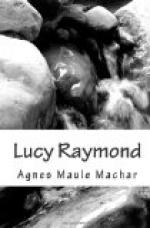Our young friends have now arrived at an age when their history is scarcely so well adapted for the youthful readers of these pages. But as we all like to hear tidings of our friends after years have elapsed, it may be pleasant to catch at least a glimpse of their later life. Lucy never returned to her uncle’s house: she became too valuable a member of her cousin’s household to be spared from it, and she is now its mistress in a legal and permanent sense, aiding her husband most efficiently in his labours of love. Fred has long since finished his studies and been settled as the minister of a village church near his sister’s home. Thither he has lately brought Mary Eastwood as the minister’s wife, and has found that she admirably fills that important post. The two old friends, united now by closer ties than ever, still delight to maintain their Christian companionship, and to revive, in the frequent visits interchanged, the happy memories of former days.
Nelly still keeps house for her brother, who would not know how to dispense with her multifarious services in weeding his beds, gathering his fruit for market, and tying up his flowers. But as some of his friends are equally sensible of her good qualities, he has made up his mind that, sooner or later, he will have to let her go.
Ada Brooke has been married for several years, and is much, the same, in her present luxurious home, as when we first made her acquaintance, with no more aspiration beyond the transient pleasures of the world. Sophy, who has remained faithful to the memory of her betrothed, is a very angel of mercy, ministering continually to the poor and sick and disconsolate, and finding therein a higher happiness than she ever knew, even in the days when she was most admired and envied. Mr. and Mrs. Brooke, since the death of their darling Stella, have thought more of that unseen world into which she has entered, and less of the present one, which formerly so completely engrossed them. And Edwin, finding all earthly sources of pleasure to be but “broken cisterns,” has at last turned to drink of “the living water, of which if a man drink he shall never thirst again.”
Bessie Ford is still the wise, motherly eldest daughter at Mill Bank Farm. If, from the uneventful character of her quiet country life, she has not filled so prominent a place in these pages as her classmates, it is not that the watchword “Looking unto Jesus” has had less influence on her life than on theirs; and though its fruits may have been more obscure, they have been as real, in the thorough Christian kindness and faithfulness, patience and industry, which make her a much-prized blessing to her family and her friends.
And now, my young reader, that you have seen the effect of taking “Looking unto Jesus” for the watchword of life to some extent illustrated, will you not, henceforward, take it as your own?




